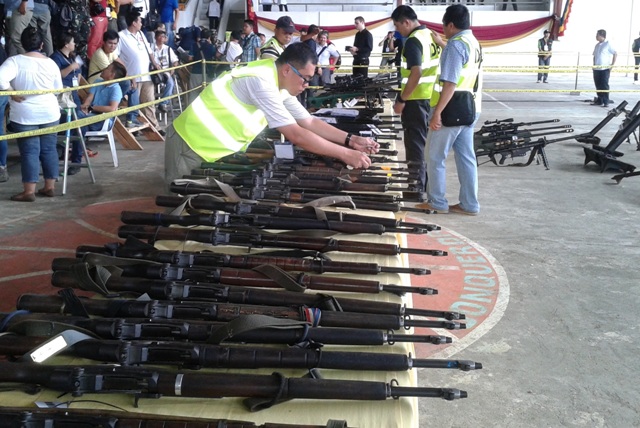
Members of the Turkey-led multinational Independent Decommissioning Body inspect the firearms turned in for safekeeping by a group of Moro Islamic Liberation Front members. Philstar.com/John Unson
The Moro guerillas decommissioned on June 16 are still trying to move on from separation with guns that were for them a badge of courage and icon of a never ending struggle for self-rule.
For now disarmed guerillas Abdulwahid and Guiamudin, who had figured in many encounters with soldiers in hostile areas in Central Mindanao, moving on from their having turned in their rifles for safekeeping by the International Decommissioning Body is like detaching slowly from pain caused by a death of a family member.
"But we have to move on just the same even if we aren’t sure yet if our (peace) agreement with government shall be implemented in letter and spirit because this is a healing process and there must be trust, there must be giving and sharing," Abdulwahid said in the Maguindanaon dialect.
The figurehead of the Moro Islamic Liberation Front, Murad Ebrahim, most known as Hadji Murad, and MILF's chief negotiator, Mohagher Iqbal, had both said it was so difficult for the 145 guerillas to agree to disarmament by the Turkey-led IDB amid uncertainties on the fate of their final peace compact with government.
Turkey is a member-state of the Organization of Islamic Cooperation, a bloc of more than 50 Muslim nations, including petroleum-exporting countries in the Middle East and North Africa.
Also helping in the government-MILF peace efforts are the European Union and Norway and OIC-members Malaysia, Indonesia, Libya and Brunei.
Matas, who also decommissioned last June 16 before President Benigno Aquino III during the symbolic disarmament of a group of MILF fighters in keeping with a normalization deal with government, said many of his younger companions cautioned him against turning over his firearm to the IDB, but proceeded nonetheless.
"Maybe by agreeing to disarm and to have my gun kept by the IDB, people opposing the BBL (Bangsamoro Basic Law) will realize that we are indeed dedicated to this peace process," he said in the vernacular.
Some of the 145 rebels that bade their firearms goodbye had, in the 1970s, fought combatants of the Philippine Army and the now defunct Philippine Constabulary alongside Hadji Murad, then still a field commander of the Moro National Liberation Front, from where the MILF had splintered from in the early 1980s.
Murad said each of the 145 guerillas have stories of pain, hunger, dislocation and joy in their many years of fighting better armed government security forces.
The guerillas turned in infantry rifles and 25 crew-served weapons such as shoulder-fire B-40 anti-tank rocket launchers, 60 and 81 millimeter mortar launchers, a .50 caliber machine gun and home-made .50 caliber long-range sniper rifles.
Some of the 145 rebels had told reporters it was for their respect for their central committee that they agreed to disarm, unmindful of the security constraints they could possibly experience without guns now to protect their communities from aggressions of all sorts.
Malacañang had promised to provide the decommissioned rebels socio-economic interventions needed to hasten their assimilation into the mainstream.
In a text message Saturday, Gov. Mujiv Hataman of the Autonomous Region in Muslim Mindanao said his office can provide them vocational schooling through the Technical Education and Skills Development Authority.
"Our TESDA office and its regional training center are ready to accommodate them. We have the HEART (Humanitarian Emergency Assistance and Response Team) ready to help them too," Hataman said.
Physician Kadil Sinolinding, Jr., who is Hataman's regional health secretary, said they will extend free general evaluation of the health of the 145 guerillas and members of their immediate families.
Sinolinding said Hataman want them and members of their families tested for diabetes, hypertension, respiratory illnesses and eye problems.
"We can also provide cataract surgery to those that have cataracts," Sinolinding said.
Hataman said they will also extend livelihood support to the 145 guerillas for them to have other sources of income needed to sustain the schooling of their children.
For Esmael, who had also turned his firearm in, the most important intervention the national government can initiate now, in addition to the immediate socio-economic packages from ARMM and Malacañang, is to ensure the enactment into law of the proposed Bangsamoro Basic Law according to its original draft.
The draft BBL, now pending in Congress, mired by controversies, is the enabling measure for the replacement of ARMM with a more empowered MILF-led Bangsamoro political entity based on the Comprehensive Agreement on Bangsamoro (CAB).
The CAB was signed on March 27, 2014 in Malacañang by government chief negotiator Miriam Coronel-Ferrer and MILF counterpart, Muhaquer Iqbal, in the presence of President Aquino, Hadji Murad, and foreign diplomats.
https://www.blogger.com/blogger.g?blogID=4004111469161356591&pli=1#editor/target=post;postID=3476448718137001972

No comments:
Post a Comment
Note: Only a member of this blog may post a comment.